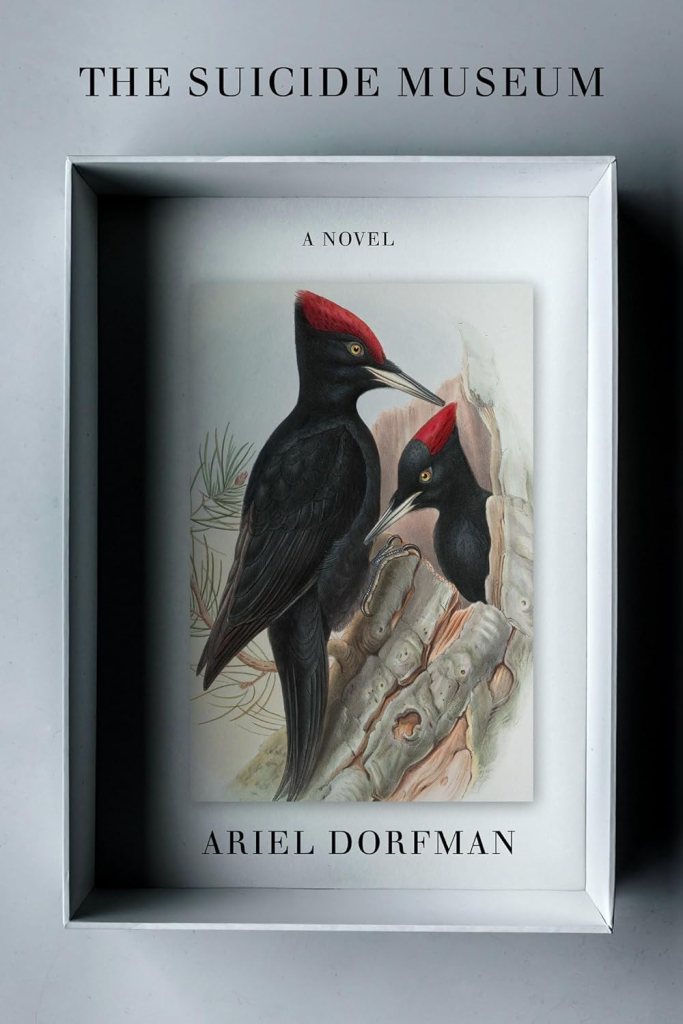In what he refers to as a “sort of epilogue” to his colossal novel, The Suicide Museum, Ariel Dorfman thanks the Spanish author Javier Cercas for the use of this quotation which appears as an epigraph: “Epic, history, poetry, the essay, journalism, memoirs: these are some of the genres that the novel has swallowed throughout its history.”
The quote is an appropriate primer for what is to come in the nearly 700 pages that follow. Dorfman’s prodigious body of work includes fiction, memoirs, essays, poetry, and plays (including Death and the Maiden), and clearly distinguishes him as an unusually versatile and prolific writer who moves between genres with the same grace he moves between continents, languages, and cultures.
Shifting in locale and time, from New York and Washington D.C., to London and Santiago, Chile, from the 1970s to the 1990s, The Suicide Museum includes historical figures and real persons, such as Dorfman’s wife, Angélica. The seamless mix of novel and memoir revolves around a reclusive, eccentric, and idealistic billionaire named Joseph Hortha who engages Dorfman to investigate the death of Salvadore Allende during the Chilean coup of 1973. For reasons of his own, Hortha is desperate to know whether Allende was murdered or committed suicide.
Dorfman has his own attachment to Allende. As a young man, he worked in the Allende administration and, save for a simple twist of fate, would have been on duty at the presidential palace, La Moneda, when it was attacked by the Chilean army and air force. His absence on September 11, 1973 haunts Dorfman, calls into question his courage and fills him with the guilt of one who survives a calamity by sheer luck. Exacerbating these feelings is the widely held idea among his contemporaries — a product of the confusion caused by the coup and the faulty memories of others — that Dorfman stood bravely at Allende’s side until the bitter and fatal end.
Included in Dorfman’s agreement with Hortha is a proviso that Dorfman not write about or disclose any details of his investigation until 30 years have passed. It’s in the process of looking back from this temporal vantage point, sifting through the distortions in his own memory, the conflicting recollections of others, and official proceedings that more often than not sanitize history and obscure responsibility, that the slippery nature of truth is illuminated.
The certainty about particular events that Hortha has carried with him are no more true than those Dorfman has borne during his long exile from Chile. It’s not surprising that recollections once so clear are now in shadow; memories are fallible to begin with and the passage of time renders them even more unreliable. During the course of their association and through soul-searching conversations, these men discover a bond that is deeper than mutual reverence for Salvador Allende. As a child, Hortha fled the Nazis and was separated from his family, while Dorfman, unlike so many of his friends and compatriots, managed to evade the murderous retribution of the Pinochet regime. Both know too well the disorienting experience of being an exile, not only from a country, but from oneself.
As Hortha unspools his grandiose design to save humanity from itself and Dorfman digs into the final days of Salvador Allende, both men come to a startling conclusion: despite their individual gifts, talents, and, in Hortha’s case, stupendous wealth, neither of them is in any way special, unique, or favored.
This review originally appeared in the California Review of Books.
Premier Events
Tue, Dec 31
5:00 PM
Santa Barbara
New Year’s Eve Dinner
Tue, Dec 31
6:00 PM
Santa Barbara
Gin + Jazz New Year’s Eve Celebration at El Encanto
Fri, Jan 03
6:00 PM
Santa Barbara
Flow’s 1st Friday Tea Social- Stuff Swap
Sun, Jan 05
7:00 PM
Santa Barbara
Jazz at the Lobero: Robert Glasper
Sun, Jan 05
7:00 PM
Santa Barbara
Taylor-Made Tapestry – A Tribute to Carole King & James Taylor
Tue, Dec 31 5:00 PM
Santa Barbara
New Year’s Eve Dinner
Tue, Dec 31 6:00 PM
Santa Barbara
Gin + Jazz New Year’s Eve Celebration at El Encanto
Fri, Jan 03 6:00 PM
Santa Barbara
Flow’s 1st Friday Tea Social- Stuff Swap
Sun, Jan 05 7:00 PM
Santa Barbara
Jazz at the Lobero: Robert Glasper
Sun, Jan 05 7:00 PM
Santa Barbara

